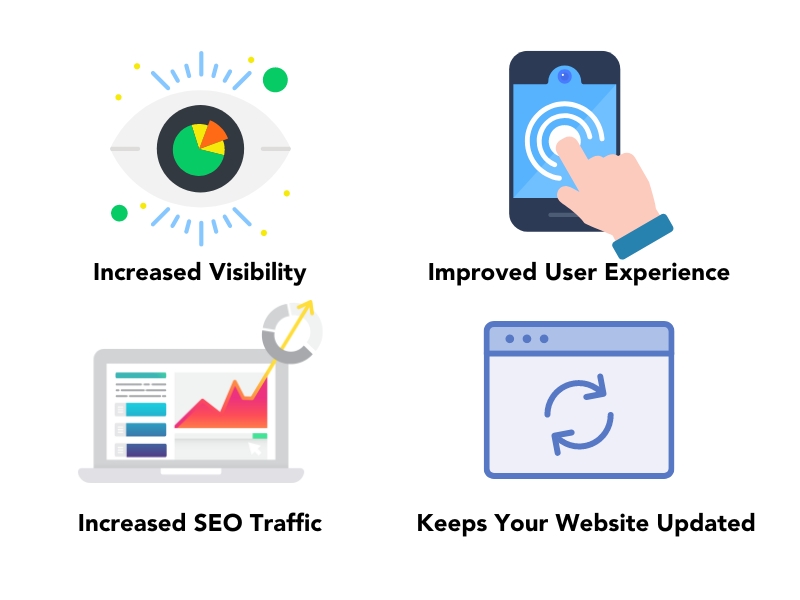Many business owners are constantly asking us about the importance of blogs to the success of their businesses, especially with all the recent interest around Chat GPT! In fact, last week we had a client ask about using AI to increase blog frequency, so most business owners already know the value of blogging. I’ll share my thoughts on that strategy later but first, how important are blogs to SEO and how often should you publish one?
Many businesses use the internet to run daily activities, but they have not leveraged it to sell themselves to potential clients through blogging quite yet. They’re missing out on a useful tactic to increase organic search leads over time! As an SEO that’s ran successful campaigns on hundreds of different websites, I’ve seen the benefits of blogging and today I’ll share my insights into the gains our clients have seen over the past 11 years.
Table of Contents
Blog Posts are an Easy Marketing Tool Anyone Can Use
Anyone capable of creating content can become their own publisher and if you’re passionate about your business like me, you’ll find it easy to write about what you do. The beautiful thing about blogging is that as long as you stay on topic, adding new posts will only help your SEO. It boosts a number of metrics that are important ranking factors like content freshness and topical authority.
There are millions of posts and blogs being published each year and no matter what business sector you’re in, if you don’t post you’ll get left behind in the race to the top of Google by all the businesses that do. This competition in modern search engines makes blogging an essential part of any online marketing strategy. Here are some of the many ways blogs are important to SEO success.
Increased Visibility
Creating quality blog content will help a business answer a more extensive range of search questions around their product or service offerings. Your blogging efforts will increase your visibility in the search engines as long as you use relevant keywords and link to other blogs, websites and authoritative sources within your niche.
For example, let’s pretend your site’s all about wine. You should have posts about each variety and maybe some content on reds versus white wines. You might also post about your favorite brands or even list some instructions on how to make wine at home. Most of your external links should point to authority sites that focus on wine too.
Consistent blogging over time gives Google an idea of what your website is about and it increases the chances of potential buyers finding you through organic search.
Improved User Experience and Reader Engagement
User experience is important to SEO. It helps to convert the visitors you get from search into potential buyers. To obtain a higher ranking, your website should offer users a unique experience when they visit your site. This will help keep your audience engaged longer and those Google Analytics metrics on dwell time and click-through rate are very important to your overall ranking in Google!
Blog posts are great for engaging readers and encouraging them to spend more time on your page by clicking around, reading other posts or taking action such as downloading resources from the blog itself. This engagement is tracked through metrics like bounce rate which are very important signals for SEO algorithms. The more engaged readers are with your content, the better it looks to Google that your business provides helpful information — a key ranking factor!

Increased SEO Traffic
Blogging can help you drive more organic traffic to your website. This is mainly because when you write a post, it’s easy to include keywords and phrases that are relevant to what people are searching for. When these keywords appear in your blog posts, they can be picked up by search engine crawlers and show up in the SERPs (search engine result pages). Your blogs should primarily focus on the ‘long tail’ variations of the primary keywords your main pages are targeting.
So, getting back to the example above, if you have a product page selling a vintage Merlot you might want a post on the best seafood pairings for Merlot to show Google you’ve covered the topic more thoroughly. And if you link to that product page, chances are it will rank better for the commercial keywords that make you money.
It Keeps Your Website Updated
When a person visits a website and finds that its content has not been updated for a long time, they will lose trust in the information available because they think your content is out of date.
Taking the time to write good content each month will keep your website updated with current information. This will show search engines that your website is alive and well. As a result, SEO algorithms will rank your website higher in search results and guide more readers to your business.
How Many Blogs Should You Post for SEO?
Wow, this question demands a very specific answer that may bother a few readers and hurt my own dwell time on page, but I just can’t resist…
The answer to how many blogs you should post for SEO is that IT DEPENDS! 🤦♂️
That’s the cliche answer that fits any SEO question, but your business goals and budget for SEO will always dictate posting frequency. If you’re happy with the performance of your SEO and haven’t noticed any dips in rankings, then blogging frequency is probably not an issue right now.
However, if you’re looking to grow your organic traffic and increase visibility for specific keywords, then blogging more frequently may be the answer. Topical authority is very important for website traffic and keyword rankings. So, if there’s 1,000 possible ways to cover your topic from a different angle, your goal should be to get to 1,000 posts published as soon as possible, while keeping your blog at the highest standards of content quality.
At a minimum, I would suggest that you post once per month to your blog. That will get you by, but remember that you’re in a publishing contest with the rest of your industry and search engines will generally reward whoever moves the fastest. Another thing they want to see is that you’re linking your blog up in a way that’s helpful to the reader.

Internal SEO Linking Is Efficient When Using Blogs
Internal links in a website are used to show the relationship between the content posted on different pages. My favorite example of this is Wikipedia. Those editors do a kick-ass job of connecting articles together so you can see the relations between similar topics.
Plus, I’m showing my age here but now that Wikipedia exists, the frequency of people randomly showing up at my door on a Saturday to sell encyclopedias has plummeted to a new all-time low! And that’s another reason for me to just ❤️ what they do aside from the good link building! These internal links are essential because they help transfer SEO authority between the important pages and blog posts on your website.
Internal linking allows the reader to dig deeper on a particular topic and explore the different posts and pages of your website. This is a great way to keep readers engaged, while helping search engine crawlers understand how everything fits together. It’s also important that you use keywords in anchor text when linking internally, as this will help Google make an even stronger connection between the two pieces of related content.
The Use of Images in Blogs to Gain More Traffic
The use of images in blogs as a search-optimizing tool is a practice that has been gaining traction over the last few years. Images in blog posts can be used to draw a person’s attention and boost engagement, while also helping search engine spiders recognize keywords on webpages and index them properly.
More importantly, images have the potential to go viral on social media platforms, which can drive thousands of new visitors to your post if you share it in the right communities.

When using images in blog posts, be sure to include relevant keywords or phrases in your file name, title and most importantly, the image alt tags so that search engine crawlers can recognize them and index your website for specific topics. Additionally, make sure to optimize the size of the image before uploading it to your post; larger file sizes can slow down the loading time of your post, causing users to bounce.
Unlimited Use of SEO Keywords in Blogs
For example, if your business primarily does roofing repairs in a small area you might be able to build location pages for each suburb you service in just a few short months. Shifting over to blog writing will allow you to answer questions like which roof material is best or how much help homeowners insurance might be in paying for a new roof.
These are questions your customers already have and it allows you to share that content on other marketing channels like email and social media. As a business owner, blogging is an excellent way to show potential customers that you’re knowledgeable in your field and know what you’re talking about. A good blog can be a boost for all your marketing efforts, so put that Chief Revenue Scientist hat on and get to writing!
How Effective Are Blogs in Marketing?
Outside of SEO, blogs can also be used to draw potential customers in with informative content. You can share your posts in newsletters, trade journals, social media or even re-purpose some of the content for print marketing. If your goal is to build credibility and trust, blogging is a great way to do that.
Blogs can create engagement, establish thought leadership and even bring in new leads with content that attracts and educates ‘top-of-funnel’ prospects who are yet to make a decision on their buying journey.

Blogging Builds a Company’s Credibility
Blogs can also offer customers and potential prospects an opportunity to learn more about your company and its values. When blogging, it’s important to provide valuable content that will help educate the reader on topics related to your industry, product or service offerings.
This helps build a sense of trust between you and your audience and gives them a reason to keep coming back for more. As with any marketing effort, consistency is key.
Blogging Offers Better Communication with Your Audience
Blogging gives you the opportunity to communicate with your audience in a more personal manner than other forms of marketing. For example, blogging allows you to engage in conversations with your readers and even get feedback from them on topics that interest them.

You can also use blogging as a platform to share updates about your business, upcoming events or product offerings that could be useful for your customers. The possibilities are endless when it comes to blogging and engaging with customers!
Blake’s Thoughts on Using AI to Boost Blog Frequency
As I promised above, I wanted to cover some of the recent developments in content production surrounding AI and GPT3. While Google originally came out against AI content, the language has softened recently and it looks like there may be a way to boost your blog production while still staying in the good graces of search engines.
First, you have to understand that the AI is not perfect and can’t replace you as the editor. What it can do is help shorten the amount of time it takes to produce content. GPT3 technology can take an existing input and create more paragraphs or phrases based on that information, and that’s one of the best use cases I’ve seen so far.
We’ve tested this by taking old posts and asking the AI to expand on them, while maintaining our same style and tone. It works really well for this because without some sort of guidance on how an article should flow, the AI tends to produce boring content.
If you give it an idea for your brand voice to work off of, it can come very close to perfection. Taking shorter blog posts and making them better is the best use case for SEO that I have personally found so far.
What you have to avoid is the temptation to simply publish AI content without fact checking or adding a human touch with personal stories, examples, and other elements that your readers are expecting.
Important Considerations on the Future of AI Content
While it’s true that search engine optimization is about to change radically with AI and Google very well may devalue publishing frequency in favor of authority signals, that doesn’t mean you should slow down with your blogs and hope that Google slaps down your competitors using AI.
Nor should you go overboard with publishing AI-heavy articles that are weak on the kind of information that can only be gained from personal experience.
Professional blogs will strike a balance in coming years between the convenience of AI and the need to meet Google’s increasingly strict standards around Experience, Expertise, Authority and Trust or ‘E-EAT’ for short.

So there you have it! – blogging plays a huge role in SEO and can help drive more organic traffic to your website. Adding a human touch to your articles will keep your blog interesting and exciting.
Make sure you keep writing regularly and focus on creating content that keeps users engaged with your business. That’s ultimately what search engines are rewarding these days, no matter if it’s you or our new robot overlords doing most of the work. Good luck with your content strategy and enjoy the journey of making it all happen! 🔥✨👍
Hire Webology for Content Marketing
At Webology, we help businesses create high-quality content that engages users and drives organic traffic to their website. Our team has over 70 years of combined experience in SEO and we know what it takes to get results. Our writers can craft a blog post that will rank rapidly in the Search Engine Results Pages (SERP) because we’re certified experts in content strategy and on-page SEO.
Additional services we offer include:
PPC
Email Marketing
Web Hosting
Design
We use blogging, social media, influencer marketing, and other strategies to help your business reach its goals.
Contact us today by filling out our form for a free consultation! 🙌🤩😃 We can’t wait to hear from you! 📣💬✍️
If you’re looking for more tips to level up your content game, be sure to check out these related posts from our blog!
About Blake Akers
I lead the team at Webology, but today I’m just the co-author of this blog. Surprise! I got a little help from AI, but I bet you didn’t even notice until I said something did you? 🦾🦾🦾













